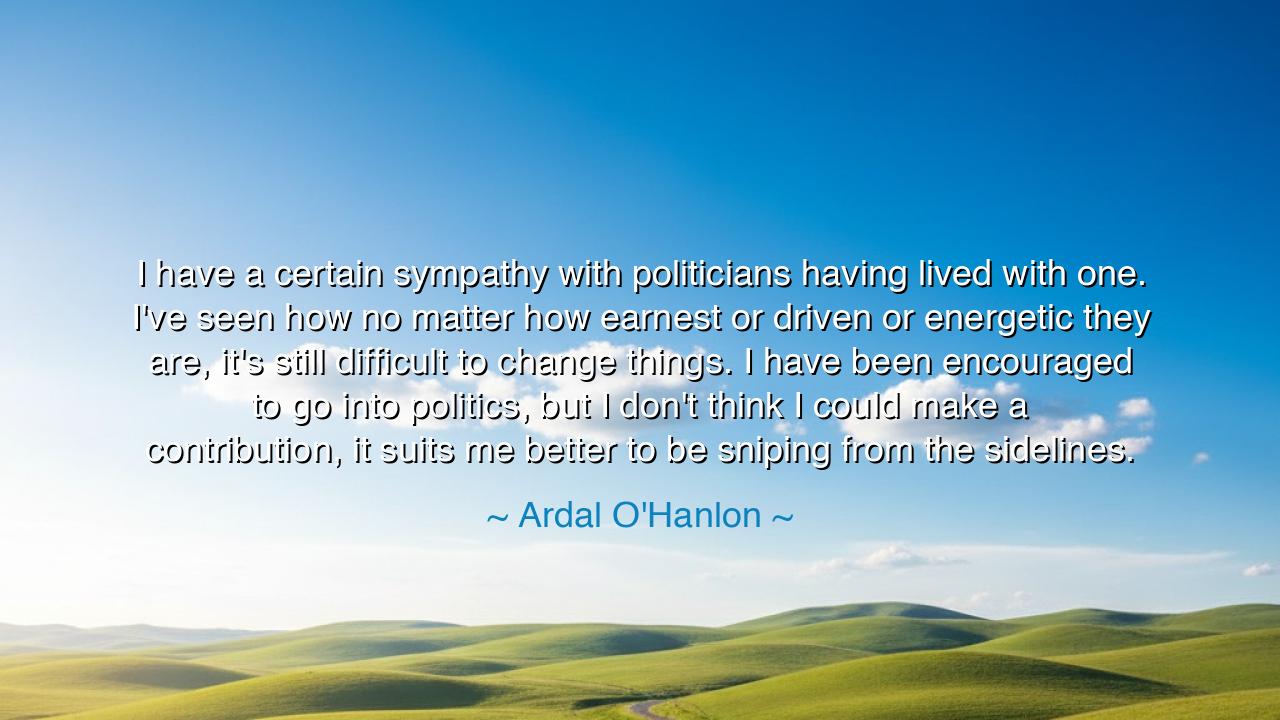
I have a certain sympathy with politicians having lived with
I have a certain sympathy with politicians having lived with one. I've seen how no matter how earnest or driven or energetic they are, it's still difficult to change things. I have been encouraged to go into politics, but I don't think I could make a contribution, it suits me better to be sniping from the sidelines.






When Ardal O’Hanlon confessed, “I have a certain sympathy with politicians having lived with one. I've seen how no matter how earnest or driven or energetic they are, it's still difficult to change things. I have been encouraged to go into politics, but I don't think I could make a contribution, it suits me better to be sniping from the sidelines,” he laid bare the eternal struggle between power and limitation, between the desire to act and the recognition of one’s true calling. His words carry not cynicism but humility, a deep awareness that even the most spirited hearts must know where they can labor most effectively.
The politician, as O’Hanlon acknowledges, is often judged harshly by the multitude. People cry out for change, for justice, for transformation, and they demand it swiftly. Yet those who dwell within the labyrinth of power discover a bitter truth: that even the most earnest will, the most driven spirit, is entangled in webs of bureaucracy, tradition, and opposition. To strive in politics is like steering a vast ship through stormy seas—it requires patience, compromise, and endurance beyond imagination. And so, he has sympathy for them, knowing the weight they bear.
This struggle is not new. Recall the tale of Marcus Aurelius, the philosopher-king of Rome. Though emperor, clothed in immense power, he confessed in his Meditations that the world could not be easily bent to his vision of virtue. He strove for justice, yet he knew that decay, greed, and the inertia of the masses were forces even emperors could not sweep aside with ease. Like O’Hanlon, he saw the difficulty of true change and bore it with a mix of resignation and perseverance.
Yet O’Hanlon’s wisdom lies also in his refusal to force himself into a role unsuited to him. Many are tempted to chase the grand stage, believing that only in high office can they shape the world. But he recognizes that his gift lies elsewhere—not in the council chamber, but in the sharp tongue of wit, the observation cast from the sidelines. For satire, critique, and the voice of the outsider have always played their part in shaping societies. Without them, power grows blind, insulated, and arrogant. Thus, the one who snipes from the sidelines is not useless, but often necessary, pricking pride and exposing folly.
Think of Aristophanes, the ancient Greek playwright, whose comedies mocked generals, philosophers, and politicians alike. His plays did not pass laws nor marshal armies, yet they stirred the people, forced them to laugh at their own leaders, and revealed truths that no official speech could contain. He stood on the sidelines, yet his words endured longer than the decrees of many who governed. In this tradition stands O’Hanlon, knowing that his true contribution lies not in drafting policy but in provoking thought, in keeping the mighty honest through humor and critique.
From this, let us take a lesson: not all service to society lies in the halls of power. To strive for politics is noble, but it is not the only path. Some are called to lead, others to labor quietly, and others still to observe and to remind. The health of a people depends not only on rulers but on those who dare to question, to critique, to make laughter a weapon against arrogance.
Practical action, then, is this: discern your true place of service. Do not rush blindly into roles that the world urges upon you if they do not fit your nature. Ask instead: where can my talents bear the greatest fruit? If you are made for leadership, lead. If you are made for creation, create. If you are made to speak from the margins, speak boldly. For in each place lies a form of contribution, and none is lesser when offered with integrity.
Therefore, let O’Hanlon’s words remain with you: sympathize with those who bear the burden of power, for their path is harder than it appears. But do not despise your own station, even if it lies on the sidelines. For whether through governance, through toil, or through the sharpness of wit, every honest labor that seeks truth and justice becomes part of the eternal struggle for a better world.






AAdministratorAdministrator
Welcome, honored guests. Please leave a comment, we will respond soon